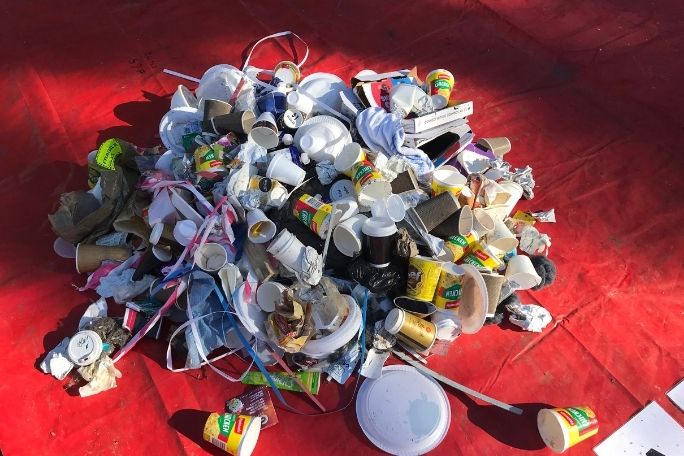Lesson summary
Students explore the impacts of plastic waste on our environment. They begin by reviewing their knowledge of waste before examining and discussing their thoughts on a selection of common waste items. Students then explore some of the impacts of plastic waste on marine environments before working in groups to investigate actions that individuals and households can take to address plastic waste and the work that organisations are doing to address plastic waste. Groups will then create a communication piece to share their research with an audience.
Learning intentions:
Students will...
- understand what plastic waste is and where it comes from
- understand some environmental issues associated with plastic waste
- recognise actions we can all take to reduce plastic waste and the impacts of plastic waste on our environment.
Success criteria:
Students can...
- work independently and collaboratively
- annotate a text
- conduct and communicate research
- create a communication piece
- participate in class and group discussions.
Lesson details
Curriculum mapping
Australian curriculum content descriptions:
Year 4 Science:
- Natural and processed materials have a range of physical properties that can influence their use (ACSSU074)
- Science knowledge helps people to understand the effect of their actions (ACSHE062)
- Represent and communicate observations, ideas and findings using formal and informal representations (ACSIS071)
Year 4 HASS (Geography):
- The use and management of natural resources and waste, and the different views on how to do this sustainably (ACHASSK090)
- Locate and collect information and data from different sources, including observations (ACHASSI074)
- Interact with others with respect to share points of view (ACHASSI080)
- Present ideas, findings and conclusions in texts and modes that incorporate digital and non-digital representations and discipline-specific terms (ACHASSI082)
Year 5 Science:
- Scientific knowledge is used to solve problems and inform personal and community decisions (ACSHE083)
- Communicate ideas, explanations and processes using scientific representations in a variety of ways, including multi-modal texts (ACSIS093)
Year 5 HASS:
- Locate and collect relevant information and data from primary sources and secondary sources (ACHASSI095)
- Work in groups to generate responses to issues and challenges (ACHASSI102)
- Present ideas, findings, viewpoints and conclusions in a range of texts and modes that incorporate source materials, digital and non-digital representations and discipline-specific terms and conventions (ACHASSI105)
Year 6 HASS:
- Locate and collect relevant information and data from primary sources and secondary sources (ACHASSI123)
- Work in groups to generate responses to issues and challenges (ACHASSI130)
- Present ideas, findings, viewpoints and conclusions in a range of texts and modes that incorporate source materials, digital and non-digital representations and discipline-specific terms and conventions (ACHASSI133)
Syllabus outcomes: ST2-13MW, ST2-11LW, ST2-4WS, GE2-2, GE2-3, GE2-4, ST3-7PW, ST3-4WS, GE3-4
General capabilities: Literacy, Critical and Creative Thinking
Cross-curriculum priority: Sustainability OI.7, OI.8
Relevant parts of Year 4 Science achievement standards: Students apply the observable properties of materials to explain how objects and materials can be used, and identify when science is used to understand the effect of their actions. They use formal and informal ways to communicate their observations and findings.
Relevant parts of Year 4 HASS achievement standards: Students identify the interconnections between components of the environment and between people and the environment. They locate, collect and sort information and data from different sources, and propose individual action in response to a local geographical challenge and identify some possible effects of their proposed action.
Relevant parts of Year 5 HASS achievement standards: Students locate and collect data and information from a range of sources to answer inquiry questions. They work with others to present their ideas, findings and conclusions in a range of communication forms using discipline-specific terms and appropriate conventions.
Relevant parts of Year 5 Science achievement standards: Students discuss how scientific developments help us solve problems, and they communicate their ideas and findings using multimodal texts.
Relevant parts of Year 6 HASS achievement standards: Students identify the purpose of business and recognise the different ways that businesses choose to provide goods and services. They locate and collect useful data and information from primary and secondary sources, and present ideas, findings, viewpoints and conclusions in a range of communication forms.
Unit of work: War On Waste – Years 4-6
Time required: 60 mins
Level of teacher scaffolding: Medium – oversee class discussions and lead the class in activities
Resources required
- A range of clean plastic waste, including food containers, water bottles, bags, wrappers, straws and food wrap – try to collect both hard and soft plastics
- Communication Piece Assessment Rubric
- Device with internet and presenting capability
- Plastic Factsheet
- Student Worksheet – one copy per student
Skills
This lesson is designed to build students’ competencies in the following skills:
- Communication
- Collaboration
- Critical thinking
- Problem solving
Additional info
Cool Australia’s War On Waste lessons have been developed in partnership with Lune Media and with support from the Australian Environmental Grantmakers Network. These lessons have been designed to lead students through a deeper understanding of some of the big issues relating to waste in Australia and to support them to take action to reduce the impact of waste on our environment.


Welcome back!
Don't have an account yet?
Log in with:
By signing up to Cool.org you consent and agree to Cool's privacy policy to
store, manage and process your personal information. To read more, please see
our privacy policy here(Opens in new tab).
Create your free Cool.org account.
Many of our resources are free, with an option to upgrade to Cool+ for premium content.
Already have an account?
Sign up with:
By signing up to Cool.org you consent and agree to Cool's privacy policy to
store, manage and process your personal information. To read more, please see
our privacy policy here(Opens in new tab).